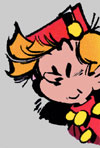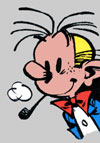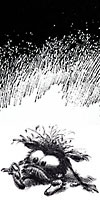|
Thanks
for the mail.
I am happy to hear that you are familiar with some of my work,
although I have done quite a lot more than the (very early)
3 albums you have seen... I hope one day to be able to publish
more books in Dutch if I can find a publisher...
Do I know Franquin? Absolutely — and he was in many
ways my entry into the wonderful world of comics!
I will gladly try to answer your questions. Here you go:
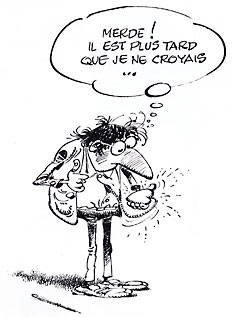 What makes Franquin so special? What makes Franquin so special?
His humanity and his ability to see the world from
a child's perspective.
To me the ultimate proof of his position as a supreme humourist
was a cartoon he made of himself standing with an oldfashioned
clock with a chain that he had taken out of his pocket exclaiming
something like: "Gosh, I didn’t know it was this
late!" Only... it wasn't a clock but his heart and the
chain was the coronary artery — only a world class humourist
would be able to laugh at himself in a serious situation like
that! Besides — a true humourist (and humanist) laughs
at himself first! |

What
was your first contact with the man his work? What do you
remember of it? Did you met him personal?
When
I was a child Franquin's work wasn't published in Danish.
I saw some of his books in French, bought them from a French
bookstore in Copenhagen with my pocket money and litterally
learned French through reading his comics with a dictionary!
Later on I got Comment on Devient Créateur de Bande
Dessinée, a book in which Philippe Vandooren
asks Franquin and Gillain (Jijé,
pd'h) questions about their profession. My mother helped
me to translate the book. I was about 15 years old and it
was a huge inspiration!
Later on I was lucky to meet Franquin at a couple of occasions.
Once I visited him in Brussels. I remember that I had this
picture in my head that his house would look something like
the castle of Champignac — and I was very disappointed
when I saw that he lived in a modern appartment with very
cool designer furniture (but actually — if
you study his comics you can easily spot his fascination with
futuristic design also). However — when we entered his
studio there was exactly the environment I had imagined —
the old table, the scraps of paper with doodles etc. He was
working on a page of Idées Noires and I was
thrilled to see that it was made almost in the same size as
the printed page — with a huge amount of details! His
waste basket was full of discharded doodles — and I
was dying to pick them up — but asking for a sketch
would make me a mere "fan" instead of a "colleague".
As much as I would have loved to have one of those drawings
I have never regretted that I didn't ask him. The experience
of being there and feeling that we were "fellow artists"
was fantastic! |

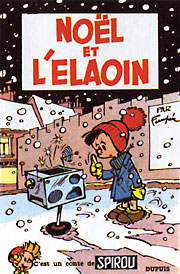 What
is your favourable Franquin album, - adventure, - joke or
- character and why? What
is your favourable Franquin album, - adventure, - joke or
- character and why?
My
favorite character is the little Noël (I don’t
know his name in Dutch) from a very romantic Christmas story
that I think was called Noël et l’Elaoin Shrédu
(Sdrétu, pd'h) or something like that.
My favorite Spirou album is very predictable: Le
Nid des Marsupilamis. |

Has
Franquin influenced your work?
Yes,
a lot. I studied his way of drawing in every detail and probably
learned a lot by copying him. Later on I luckily got other
"heroes" that I copied for a while and (hopefully)
I have gradually been able to let go of the influences and
find my own solutions. The thing is — Franquin had his
own special way of drawing a cow for instance. But it was
his own unique way and he probably found it after days or
weeks of studies. A lot of the details are not at all naturalistic
(the mouth for instance) but the finished creature looks just
right and is a perfect caricature of a cow. However, when
somebody else copies it (and there are a lot of "Franquin
cows" out there in other comics) it rings false because
the drawing is not based on personal observations like his.
There are no shortcuts, we all have to make our own observations! |

What
impact has Franquin on the comic world today?
I think he has shown us all that it is possible
to create a totally personal vision.
All in his comics have been through his "filter".
He didn’t just make small guys with big noses, all
his characters are human beings with personalities, all
his animals are personalities — and even the "dead"
things, like buildings or cars are caricatures that bear
his stamp — his vision!
When I look at his comics they always make me want to work
harder — and they remind me of how much fun this work
is!
[vertaald
door David Steenhuyse]
|
|
|

|

